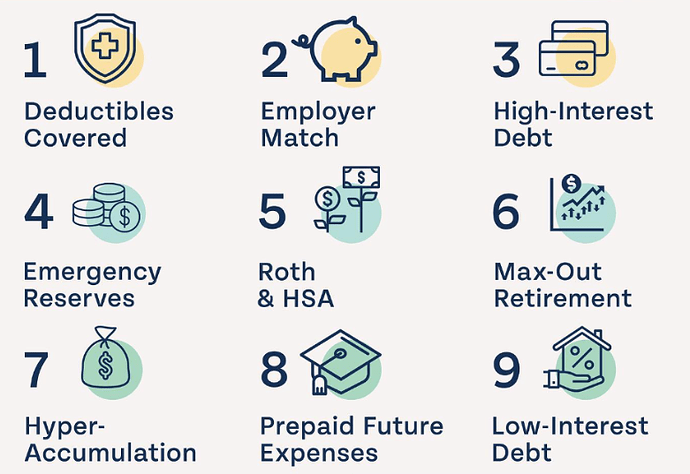This is intended to be a thread to discuss personal finance not directly related to Pokemon.
That can include sharing tips on personal finance, asking questions, discussing current events related to personal finance, or sharing resources or articles you find helpful or interesting. Or anything else relevant to the topic!
It’s not recommended to share personal information.
Thought I’d start the thread off with a helpful topic, the "Financial Order Operations:. Please note that this is from a US lens, would be great to hear about anything similar from other places in the world.
The Financial Order of Operations is intended to help make the decision of what to do with your next dollar, outside of buying more cardboard of course. The concept here is to maximize your tax benefits, minimize debt payments, and help you grow your money to reach financial independence.
Here’s an infographic from The Money Guy show, which I enjoy watching/listening to on Youtube.
The first step is covering your insurance deductibles. If something goes wrong for your house, health, car, or pet, having that saved up is important to reduce the chances of putting yourself into debt.
Second is to take advantage of your employer’s retirement account match, if one is offered. An employer match is a 50% or 100% return on your money, or something a little different, based on what your employer offers. And that money will grow over time!
Third is paying off high interest debt. These are debts like credit cards, or potentially high interest car loans, student loans, or other loans. Something like a mortgage is not considered a high interest debt.
Next is to set up your financial reserves. AKA an emergency fund. Most people will have an emergency fund of 1-6 months of your expenses, some people like to have 12 months if they’re more conservative, or older with limited income. Necessary steps here are to analyze your spending to identify your monthly expenses, and then figure out how many months you want to have saved up. If your expenses are pretty stable, your household income is pretty stable, and you don’t have much debt, you can probably be on the shorter end of things. If you have a variable income, or just prefer to have more cash on hand, you can lean to the longer end of things.
Next are Roth and HSA contributions. A Roth contribution is different from a Traditional contribution in that you pay taxes on contributions now, and will be able to withdraw them tax free in the future, assuming you meet withdrawal requirements. An HSA is a health spending account, which some employers offer, and is considered a high deductible health plan (HDHP). Contributions to an HSA are tax free going in, grow tax free if invested, and are tax free to withdraw as long as the fund are used for healthcare expenses.
Step 6 is to max out retirement accounts. This includes IRAs, 401ks, 403bs, and 457 plans. These are all tax advantaged accounts, but have limitations of when you can withdraw the money. There are limitations to how much can be contributed to these different accounts based on factors like annual income, and if you are married or single.
Step 7 is hyperaccumulation, or investing a large % of your income. The Money Guys define this as 25% or more of your income. This may occur within your work sponsored retirement accounts, or could occur in outside investment accounts as well.
Next step is pre-paid future expenses. If you have or want kids, this could include a college fund, This step is optional for some if they don’t have future expenses outside of retirement they want to save up for.
Last step is low interest debt, typically including mortgages. This could also include student loans depending on your age and your interest rates.
I hope this thread can be a place where we can discuss personal finance to help all of us better our financial situations to reduce stress and increase the amount we can spend on cardboard without that guilty feeling. This is a topic I’m passionate about, and love talking about!


